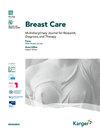Neratinib as extended adjuvant treatment of HER2-positive/HR-positive early breast cancer patients in Germany, Austria and Switzerland: interim results of the prospective, observational ELEANOR study
IF 2.1
4区 医学
Q2 OBSTETRICS & GYNECOLOGY
引用次数: 0
Abstract
Introduction: Prognosis of patients diagnosed with HER2+ early breast cancer (eBC) has substantially improved, but distant recurrences impacting quality of life and survival still occur. One treatment option for extended adjuvant treatment in patients with HER2+/HR+ eBC is neratinib; available in Europe for patients who completed adjuvant trastuzumab-based therapy within 1 year. The ELEANOR study is investigating the real-world use of neratinib in Germany, Austria and Switzerland. Results from an interim analysis of the first 200 patients observed for ≥3 months are reported. Methods: The primary objective of this prospective, multicentre, observational study is to assess patient adherence to neratinib (defined as percentage of patients taking neratinib on ≥75% prescribed days). Secondary objectives are patient characteristics and treatment outcomes. Results: At cut-off (May 2, 2022), 202 patients had been observed for ≥3 months, with neratinib treatment documented for 187 patients (median age 53.0 years; 67.9% at increased risk of disease recurrence). In total 151 (80.7%) patients had received prior neoadjuvant treatment; of these 82 (54.3%) achieved a pathological complete response. Neratinib was initiated at a median 3.6 months after trastuzumab-based treatment, with 36.4% starting at a dose <240 mg/day. Treatment is ongoing for 46.0% of patients, with median treatment duration of 11.2 (interquartile range 0.9–12.0) months. Diarrhoea was the most common adverse event (78.6% any grade, 20.3% Grade ≥3); pharmacologic prophylaxis was used in 85.6% of patients. Conclusions: The pattern of anti-HER2 pretreatment observed reflected the current treatment for HER2+/HR+ eBC in Germany, Austria and Switzerland. These interim results suggest that neratinib as an extended adjuvant is a feasible option after various anti-HER2 pretreatments, and that its tolerability can be managed and improved with proactive diarrhoea management. ClinicalTrials.gov identifier: NCT04388384在德国、奥地利和瑞士,Neratinib作为her2阳性/ hr阳性早期乳腺癌患者的延长辅助治疗:前瞻性、观察性ELEANOR研究的中期结果
HER2+早期乳腺癌(eBC)患者的预后已显著改善,但影响生活质量和生存的远处复发仍时有发生。HER2+/HR+ eBC患者延长辅助治疗的一种治疗选择是neratinib;在欧洲可用于1年内完成辅助曲妥珠单抗治疗的患者。埃莉诺研究正在调查在德国、奥地利和瑞士使用neratinib的实际情况。报告了前200例患者观察≥3个月的中期分析结果。方法:这项前瞻性、多中心、观察性研究的主要目的是评估患者对neratinib的依从性(定义为≥75%规定天数服用neratinib的患者百分比)。次要目标是患者特征和治疗结果。结果:截止日期(2022年5月2日),202例患者观察≥3个月,有187例患者接受了奈拉替尼治疗(中位年龄53.0岁;67.9%的人疾病复发风险增加)。共有151例(80.7%)患者曾接受过新辅助治疗;其中82例(54.3%)达到病理完全缓解。Neratinib在曲妥珠单抗治疗后的中位3.6个月开始治疗,有36.4%的患者以240mg /天的剂量开始治疗。46.0%的患者持续治疗,中位治疗持续时间为11.2个月(四分位数间距0.9-12.0)。腹泻是最常见的不良事件(78.6%为任何级别,20.3%为≥3级);85.6%的患者采用药物预防。结论:观察到的抗HER2预处理模式反映了德国、奥地利和瑞士目前对HER2+/HR+ eBC的治疗。这些中期结果表明,在各种抗her2预处理后,neratinib作为扩展佐剂是一种可行的选择,并且可以通过积极的腹泻管理来管理和改善其耐受性。ClinicalTrials.gov识别码:NCT04388384
本文章由计算机程序翻译,如有差异,请以英文原文为准。
求助全文
约1分钟内获得全文
求助全文
来源期刊

Breast Care
医学-妇产科学
CiteScore
4.40
自引率
4.80%
发文量
45
审稿时长
6-12 weeks
期刊介绍:
''Breast Care'' is a peer-reviewed scientific journal that covers all aspects of breast biology. Due to its interdisciplinary perspective, it encompasses articles on basic research, prevention, diagnosis, and treatment of malignant diseases of the breast. In addition to presenting current developments in clinical research, the scope of clinical practice is broadened by including articles on relevant legal, financial and economic issues.
 求助内容:
求助内容: 应助结果提醒方式:
应助结果提醒方式:


